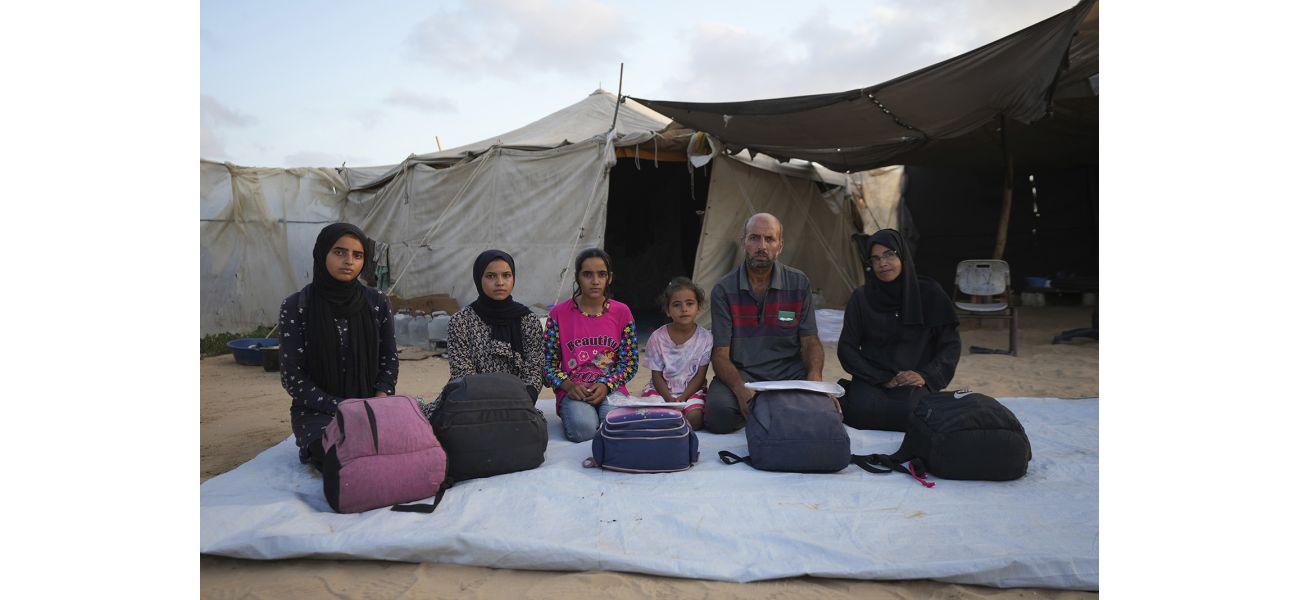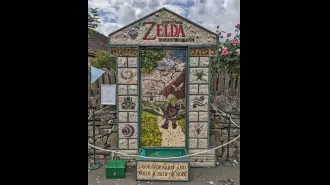Following a family's journey through multiple moves across war-torn Gaza.
A family with six daughters has been trying to survive in Gaza while Israeli forces cause destruction for a year.
October 6th 2024.

Ne'man Abu Jarad sat on a tarp spread out on the ground, surrounded by walls made of canvas sheets hung from cords. This was his makeshift tent where he, his wife Majida, and their six daughters have been living for the past year. They have been constantly on the move, trekking through the Gaza Strip, trying to survive amidst the destruction caused by Israeli forces.
It's hard to believe that just a year ago, the Abu Jarad family lived in a cozy home in northern Gaza. It was a place of comfort, filled with familiar routines and a sense of safety. A place where the scent of roses and jasmine flowers filled the air as loved ones gathered on the rooftop.
Ne'man reminisced, "Your house is your homeland. Everything good in our life was the home. We are missing all that." But everything changed when Israel launched its campaign in Gaza in response to a Hamas attack on October 7.
The family followed the orders of the Israeli military and evacuated from their home. They did this seven times, as they were constantly on the move to escape the bombings. They have lost all stability and familiarity, and their once middle-class life has been reduced to ruins.
Before the war, their days were simple and filled with joy. Ne'man worked as a taxi driver while Majida took care of their daughters and their home. Majida's face lit up as she spoke about her kitchen, which was the heart of their family life. Ne'man had even planted a garden and filled their rooftop with potted flowers, which he would tend to every day. Their home was a source of pride and joy for the family.
Everything changed on October 7 when Hamas launched rockets and Israel responded with airstrikes. The Abu Jarad's home, which was only 2 kilometers from the border fence, became a target. The family quickly packed their belongings and left, following the evacuation orders.
They tried to stay nearby, seeking refuge at Majida's parents' house in the neighboring town of Beit Lahiya. But even there, they were not safe. Over the course of six days, they experienced the horror of Israeli strikes, which killed dozens of people in their town.
As the bombings intensified, the family had to flee once again. They sought refuge at al-Quds hospital, where they witnessed the true scale of displacement in Gaza. The hospital was packed with thousands of people seeking shelter. The Abu Jarad family found a small space on the floor, barely enough room for all of them to sit on their blanket.
The next day, a strike hit a nearby house, killing a doctor and his family. This was the final straw for the Israeli military, who ordered all civilians to leave northern Gaza. The Abu Jarad family joined the mass exodus of hundreds of thousands of people walking south across Wadi Gaza, a stream that divides the north from the rest of the strip.
They walked 10 kilometers to a UN-run school in Nuseirat refugee camp, where they lived for over 10 weeks. The conditions were cramped and unbearable, with the family sleeping on the floor and struggling to find enough food and clean water. They had to line up for hours to get a piece of bread from the few remaining bakeries.
But they were forced to leave once again when Israel ordered the evacuation of Nuseirat. The family walked 20 kilometers to the city of Rafah, where they set up a tent in a massive camp filled with tens of thousands of other displaced Palestinians. They thought they had finally found a safe place, but in early May, Israel once again ordered the evacuation of Rafah and bombarded the city.
The Abu Jarad family, along with over 1 million other Palestinians, fled once again, this time heading to a former amusement park in Muwasi, near the coast. Here, they lived in a tent and struggled to survive with little aid, food, or water. Amenities that were once taken for granted, like a kitchen and a shower, were now distant memories.
The weeks turned into months, and the family was constantly on the move, trying to find a safe place to call home. But their journey seemed never-ending, with new airstrikes and evacuation orders forcing them to flee over and over again.
Ne'man and Majida's only hope is to return to their home in northern Gaza, but they have learned that their house was destroyed in a strike. They wonder about their beautiful garden and hope that the flowers have survived, even if their home is gone. In the midst of the chaos and destruction, the Abu Jarad family dreams of a peaceful and stable home, where they can once again gather on the rooftop and smell the scent of roses and jasmine.
It's hard to believe that just a year ago, the Abu Jarad family lived in a cozy home in northern Gaza. It was a place of comfort, filled with familiar routines and a sense of safety. A place where the scent of roses and jasmine flowers filled the air as loved ones gathered on the rooftop.
Ne'man reminisced, "Your house is your homeland. Everything good in our life was the home. We are missing all that." But everything changed when Israel launched its campaign in Gaza in response to a Hamas attack on October 7.
The family followed the orders of the Israeli military and evacuated from their home. They did this seven times, as they were constantly on the move to escape the bombings. They have lost all stability and familiarity, and their once middle-class life has been reduced to ruins.
Before the war, their days were simple and filled with joy. Ne'man worked as a taxi driver while Majida took care of their daughters and their home. Majida's face lit up as she spoke about her kitchen, which was the heart of their family life. Ne'man had even planted a garden and filled their rooftop with potted flowers, which he would tend to every day. Their home was a source of pride and joy for the family.
Everything changed on October 7 when Hamas launched rockets and Israel responded with airstrikes. The Abu Jarad's home, which was only 2 kilometers from the border fence, became a target. The family quickly packed their belongings and left, following the evacuation orders.
They tried to stay nearby, seeking refuge at Majida's parents' house in the neighboring town of Beit Lahiya. But even there, they were not safe. Over the course of six days, they experienced the horror of Israeli strikes, which killed dozens of people in their town.
As the bombings intensified, the family had to flee once again. They sought refuge at al-Quds hospital, where they witnessed the true scale of displacement in Gaza. The hospital was packed with thousands of people seeking shelter. The Abu Jarad family found a small space on the floor, barely enough room for all of them to sit on their blanket.
The next day, a strike hit a nearby house, killing a doctor and his family. This was the final straw for the Israeli military, who ordered all civilians to leave northern Gaza. The Abu Jarad family joined the mass exodus of hundreds of thousands of people walking south across Wadi Gaza, a stream that divides the north from the rest of the strip.
They walked 10 kilometers to a UN-run school in Nuseirat refugee camp, where they lived for over 10 weeks. The conditions were cramped and unbearable, with the family sleeping on the floor and struggling to find enough food and clean water. They had to line up for hours to get a piece of bread from the few remaining bakeries.
But they were forced to leave once again when Israel ordered the evacuation of Nuseirat. The family walked 20 kilometers to the city of Rafah, where they set up a tent in a massive camp filled with tens of thousands of other displaced Palestinians. They thought they had finally found a safe place, but in early May, Israel once again ordered the evacuation of Rafah and bombarded the city.
The Abu Jarad family, along with over 1 million other Palestinians, fled once again, this time heading to a former amusement park in Muwasi, near the coast. Here, they lived in a tent and struggled to survive with little aid, food, or water. Amenities that were once taken for granted, like a kitchen and a shower, were now distant memories.
The weeks turned into months, and the family was constantly on the move, trying to find a safe place to call home. But their journey seemed never-ending, with new airstrikes and evacuation orders forcing them to flee over and over again.
Ne'man and Majida's only hope is to return to their home in northern Gaza, but they have learned that their house was destroyed in a strike. They wonder about their beautiful garden and hope that the flowers have survived, even if their home is gone. In the midst of the chaos and destruction, the Abu Jarad family dreams of a peaceful and stable home, where they can once again gather on the rooftop and smell the scent of roses and jasmine.
[This article has been trending online recently and has been generated with AI. Your feed is customized.]
[Generative AI is experimental.]
0
0
Submit Comment





